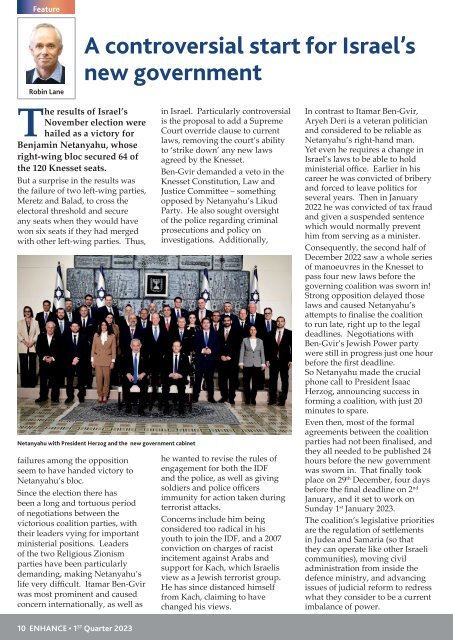ENHANCE - 1st Quarter 2023
The first quarter 2023 edition of our renamed magazine - now 'Enhance' - with our usual mixture of reports, articles and word studies, as well as resources.
The first quarter 2023 edition of our renamed magazine - now 'Enhance' - with our usual mixture of reports, articles and word studies, as well as resources.
You also want an ePaper? Increase the reach of your titles
YUMPU automatically turns print PDFs into web optimized ePapers that Google loves.
Feature<br />
Robin Lane<br />
A controversial start for Israel’s<br />
new government<br />
The results of Israel’s<br />
November election were<br />
hailed as a victory for<br />
Benjamin Netanyahu, whose<br />
right-wing bloc secured 64 of<br />
the 120 Knesset seats.<br />
But a surprise in the results was<br />
the failure of two left-wing parties,<br />
Meretz and Balad, to cross the<br />
electoral threshold and secure<br />
any seats when they would have<br />
won six seats if they had merged<br />
with other left-wing parties. Thus,<br />
Netanyahu with President Herzog and the new government cabinet<br />
failures among the opposition<br />
seem to have handed victory to<br />
Netanyahu’s bloc.<br />
Since the election there has<br />
been a long and tortuous period<br />
of negotiations between the<br />
victorious coalition parties, with<br />
their leaders vying for important<br />
ministerial positions. Leaders<br />
of the two Religious Zionism<br />
parties have been particularly<br />
demanding, making Netanyahu’s<br />
life very difficult. Itamar Ben-Gvir<br />
was most prominent and caused<br />
concern internationally, as well as<br />
in Israel. Particularly controversial<br />
is the proposal to add a Supreme<br />
Court override clause to current<br />
laws, removing the court’s ability<br />
to ‘strike down’ any new laws<br />
agreed by the Knesset.<br />
Ben-Gvir demanded a veto in the<br />
Knesset Constitution, Law and<br />
Justice Committee – something<br />
opposed by Netanyahu’s Likud<br />
Party. He also sought oversight<br />
of the police regarding criminal<br />
prosecutions and policy on<br />
investigations. Additionally,<br />
he wanted to revise the rules of<br />
engagement for both the IDF<br />
and the police, as well as giving<br />
soldiers and police officers<br />
immunity for action taken during<br />
terrorist attacks.<br />
Concerns include him being<br />
considered too radical in his<br />
youth to join the IDF, and a 2007<br />
conviction on charges of racist<br />
incitement against Arabs and<br />
support for Kach, which Israelis<br />
view as a Jewish terrorist group.<br />
He has since distanced himself<br />
from Kach, claiming to have<br />
changed his views.<br />
In contrast to Itamar Ben-Gvir,<br />
Aryeh Deri is a veteran politician<br />
and considered to be reliable as<br />
Netanyahu’s right-hand man.<br />
Yet even he requires a change in<br />
Israel’s laws to be able to hold<br />
ministerial office. Earlier in his<br />
career he was convicted of bribery<br />
and forced to leave politics for<br />
several years. Then in January<br />
2022 he was convicted of tax fraud<br />
and given a suspended sentence<br />
which would normally prevent<br />
him from serving as a minister.<br />
Consequently, the second half of<br />
December 2022 saw a whole series<br />
of manoeuvres in the Knesset to<br />
pass four new laws before the<br />
governing coalition was sworn in!<br />
Strong opposition delayed those<br />
laws and caused Netanyahu’s<br />
attempts to finalise the coalition<br />
to run late, right up to the legal<br />
deadlines. Negotiations with<br />
Ben-Gvir’s Jewish Power party<br />
were still in progress just one hour<br />
before the first deadline.<br />
So Netanyahu made the crucial<br />
phone call to President Isaac<br />
Herzog, announcing success in<br />
forming a coalition, with just 20<br />
minutes to spare.<br />
Even then, most of the formal<br />
agreements between the coalition<br />
parties had not been finalised, and<br />
they all needed to be published 24<br />
hours before the new government<br />
was sworn in. That finally took<br />
place on 29 th December, four days<br />
before the final deadline on 2 nd<br />
January, and it set to work on<br />
Sunday 1 st January <strong>2023</strong>.<br />
The coalition’s legislative priorities<br />
are the regulation of settlements<br />
in Judea and Samaria (so that<br />
they can operate like other Israeli<br />
communities), moving civil<br />
administration from inside the<br />
defence ministry, and advancing<br />
issues of judicial reform to redress<br />
what they consider to be a current<br />
imbalance of power.<br />
10 <strong>ENHANCE</strong> • 1 ST <strong>Quarter</strong> <strong>2023</strong>
















